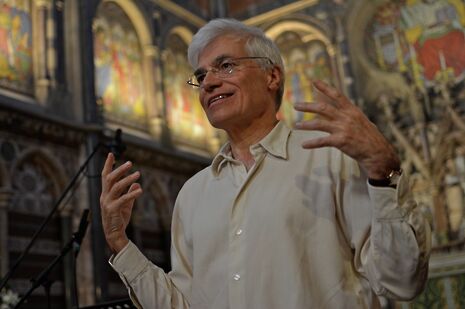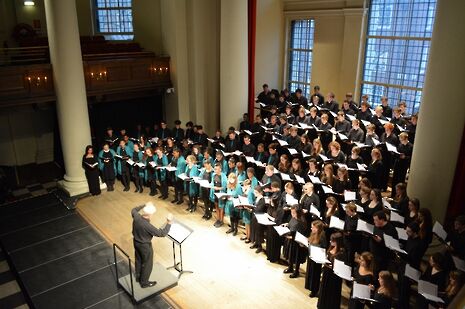Choirs in Conversation – Part 3
Our Music Editor Karl Schwonik sits down with renowned Cambridge director Ralph Allwood

Following 26 years as Director of Music at Eton College, Ralph Allwood joined the University of Cambridge as Director of Chapel Music and Fellow Commoner at Queens’ College. Allwood is widely thought to be one of the most influential ‘voices’ in the choir world and is renowned for his drive, passion and entrepreneurial spirit. We caught up with Allwood this week before rehearsal to discuss his projects, the state of choirs and how he envisions music’s place at the University and in society. Sitting in the Queens’ SCR, overlooking the Mathematical Bridge and the hussle and bussle of students and tourists, Allwood was relaxed and candid about his work and career. At 66, he has tremendous energy for teaching as well as learning.
Varsity: Why are choirs so important to Cambridge?
Allwood: Really thriving communities often have music at their heart. The magic of good music is that, if it can be experienced, it will be preserved. Chapel is at the heart of most colleges at Cambridge. The head of house in each college has a special seat in this chapel. Choirs, and music in general, have been at the centre of Cambridge colleges for literally centuries.
V: Cambridge can be both celebrated and criticised for ‘living in the past’ as it were. Does this apply to your work or choirs in general?
A: Part of living in the past, are extraordinary formal halls! I always make an effort to eat with my students in college. There is so much to learn...I am constantly learning from my students. And what better place to get a world-class meal? In the ‘old days’ there tended to be more of those eccentric old bachelors who were tutors. They were deeply concerned with the well-being of students and were always available for a conversation of a glass of sherry.
In terms of new music, you need to try it out to see. Many modern composers are absolutely brilliant. Arvo Part for example is absolutely brilliant, I love working with his music. Eric Whitacre is another example of a modern composer doing interesting work and using the internet.
V: Tell us more about your journey to Cambridge, did you attend Eton and then Cambridge?
A: My mother had parents who were quite restrictive, they hardly allowed her to do anything. In turn, she let us (there were 5 of us kids) do everything. This included everything from trading in the TV set for a piano, to taking a punt on the river by ourselves.
I attended state, and later-on, grammar schools, then enrolled in a Maths/Physics degree at Durham. My father was working in these areas so I was naturally interested. Part way through my degree, I knew I needed to switch into music. The plan was to graduate and find a state school where there was no music program, go in, and start one up.
After Durham, I finished my training at Cambridge and was head-hunted for a job at an independent school. Soon I moved on to Eton and loved it. Great people at Eton. Great people at Cambridge too. I had to leave Eton before I had worked past my prime and had no option but to retire. I have at least ten years left in me and Cambridge is a wonderful place to be.

V: What do you look for in young singers who want to work with you?
A: I’m terrified of auditions. There are too many details and too much at stake. Often, there will be a scholarship decided from these auditions that affects a student’s life for the next 4 years. It is just too stressful for the audition panel.
All that being said, and much like rowing, when a choir group is in sync with each other it pings, it works. In auditions, I look for a good voice, good musicianship, reliability, sheer niceness, willingness to do more and, most importantly, enthusiasm.
Enthusiasm is not the only quality a singer needs, but it is becoming so very important for the young musician. Over the decades of teaching, I have really seen enthusiasm levels skyrocketing.
V: The world is changing. We have Brexit, Trump and many other significant changes. How does this affect your world?
A: It it’s about anything, it's about education. I believe that two things are happening, or should happen, for education. First, is online. We have not fully taken advantage of learning online. Music is not exempt from this, we need to do more of it as well.
Second is my dynamic, directed learning. We need to watch how children develop and give them more directed, personal choices. Why do we have Maths at 9am, Science at 9:40 and so on until we get to music after school? What about Choir practice at 10:30am? Or making education tailored for each child.
I always say, “Education is for a job and for a joy”.
V: What’s it like to be allowed to walk on the lawn?
A: I absolutely love it! Eton and John’s are partner institutions so I would come visit Cambridge throughout the years. But only senior members could walk on the lawn. So, I requested this status...not for anything like dining or anything like that. Just because I wanted to walk on that lawn. The first time was pure bliss. But then a Porter abruptly came over and summarily threw me out. I was speechless.
Ten years later is the next time I had the courage to walk on the lawn. This time, I walked all the way across on a diagonal and just sat down. I then heard some very fast footsteps. When the Porter came, we just laughed for some time and I said, “I’m so pleased that I walked all the way across here and you come to tell me off.”
 News / Fitz students face ‘massive invasion of privacy’ over messy rooms23 April 2024
News / Fitz students face ‘massive invasion of privacy’ over messy rooms23 April 2024 News / Cambridge University disables comments following Passover post backlash 24 April 2024
News / Cambridge University disables comments following Passover post backlash 24 April 2024 Comment / Gown vs town? Local investment plans must remember Cambridge is not just a university24 April 2024
Comment / Gown vs town? Local investment plans must remember Cambridge is not just a university24 April 2024 News / Students organise Cambridge’s first female and non-binary club night25 April 2024
News / Students organise Cambridge’s first female and non-binary club night25 April 2024 Arts / ‘Walking around Robinson is automatically humbling’: college architecture and the psyche24 April 2024
Arts / ‘Walking around Robinson is automatically humbling’: college architecture and the psyche24 April 2024





